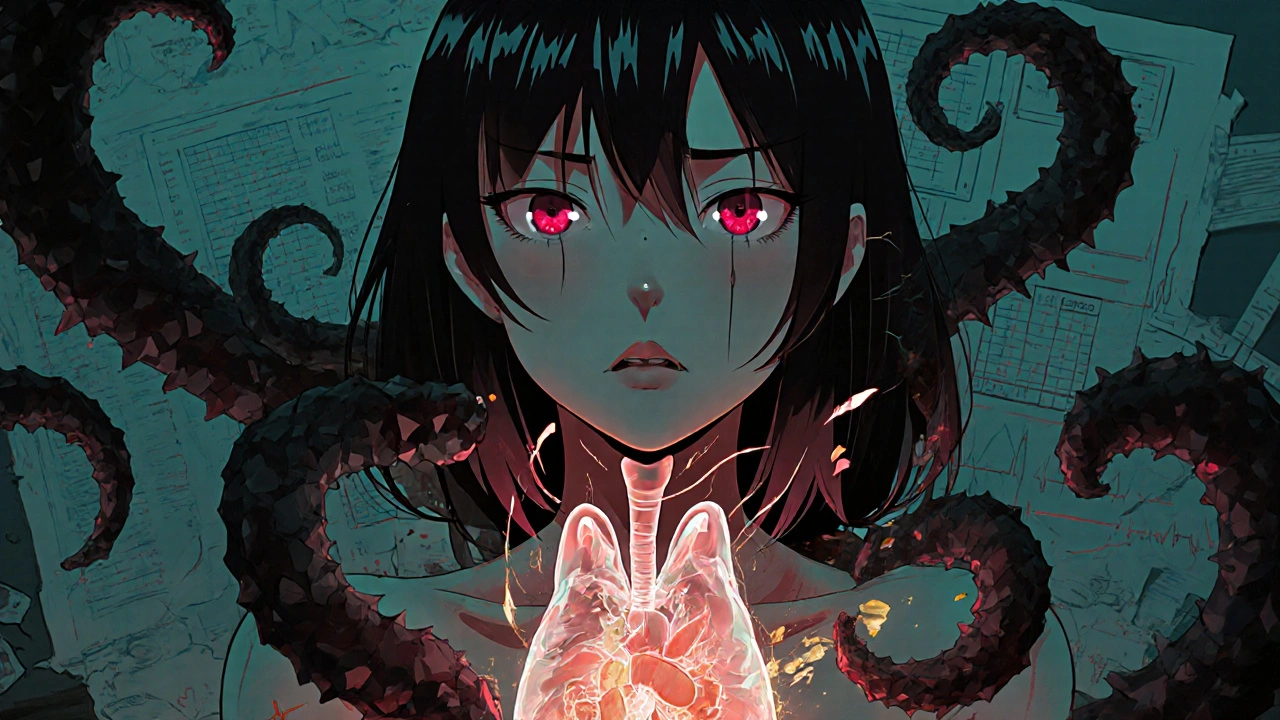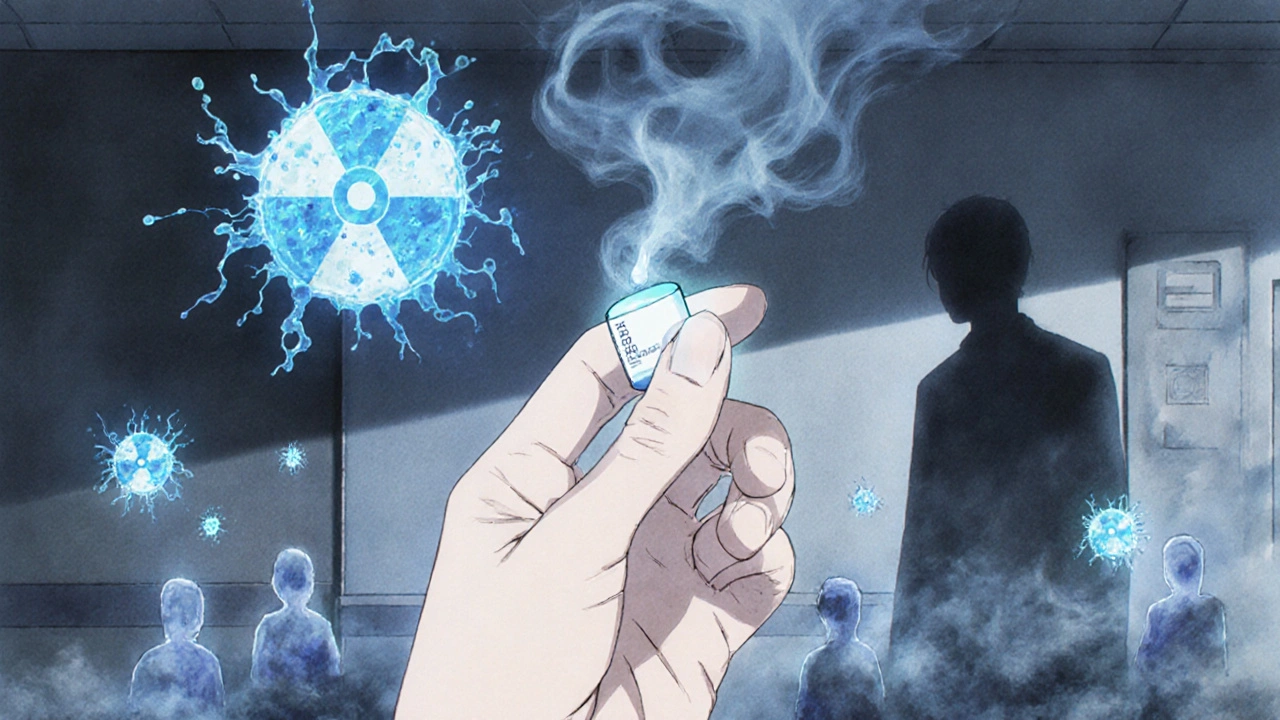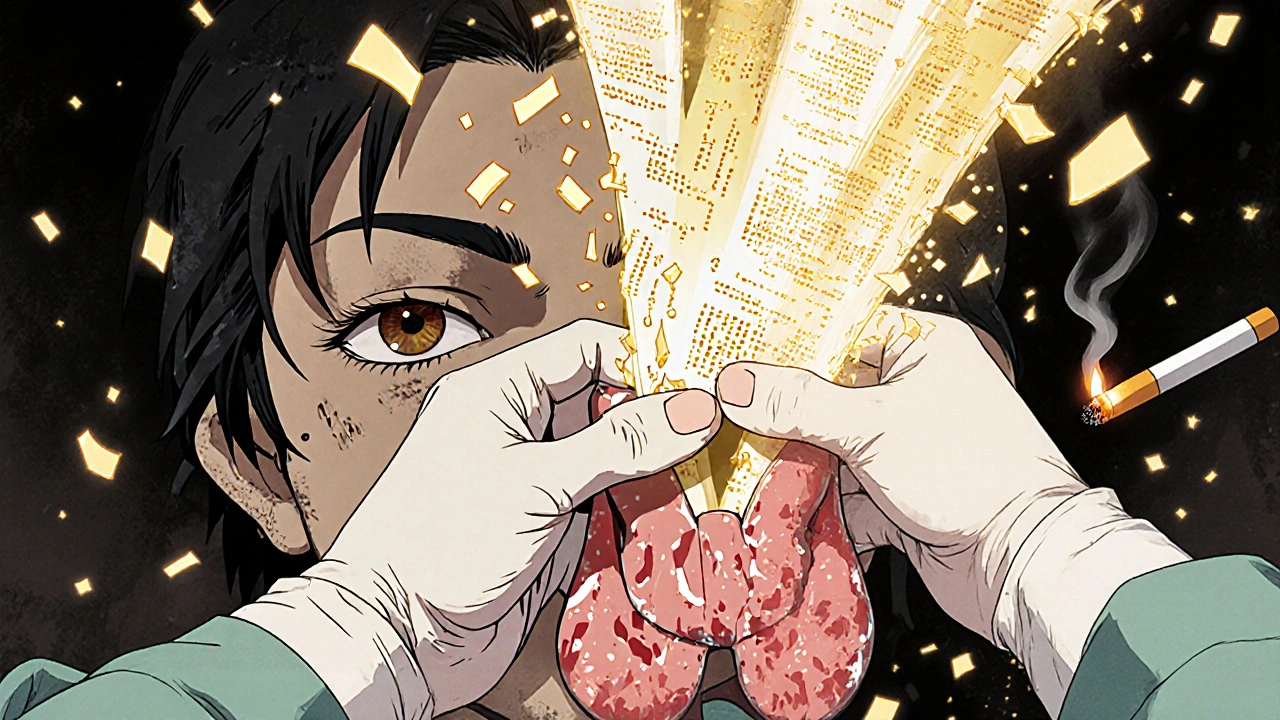Graves’ Disease: Understanding Autoimmune Hyperthyroidism and Your Treatment Options

Graves’ disease isn’t just another thyroid problem. It’s your immune system turning against you. Instead of protecting your body, it sends out faulty signals that force your thyroid to pump out too much hormone. The result? A body running too fast - heart racing, nerves frayed, weight slipping away even when you’re eating more. It’s exhausting, confusing, and often misunderstood. If you’ve been told you have it, you’re not alone. About 1 in 50 women will develop Graves’ disease in their lifetime, and it’s the number one reason people end up with hyperthyroidism.
What Actually Happens in Your Body?
Your thyroid sits at the base of your neck and controls your metabolism. Normally, it listens to signals from your brain - specifically, a hormone called TSH. In Graves’ disease, your immune system makes strange antibodies called thyroid-stimulating immunoglobulins (TSI). These act like fake TSH. They latch onto your thyroid and tell it to keep producing hormones, no matter how much is already in your blood.
This isn’t a slow burn. The hormone overload hits fast. You might start feeling anxious for no reason, your hands shake, you can’t sleep, and you’re sweating through your clothes even when it’s cool. Your heart races - sometimes over 100 beats per minute even at rest. You lose weight even if you’re eating more. You might feel weak in your shoulders or hips. Bowel movements become frequent. And if you’re a woman between 30 and 50, your risk is seven to eight times higher than a man’s.
One of the most visible signs? Bulging eyes. About 3 in 10 people with Graves’ get what’s called Graves’ ophthalmopathy. Your eyes don’t just look different - they can feel gritty, water constantly, double, or even hurt. In severe cases, vision can be threatened. And if you smoke? Your risk of bad eye problems jumps 7 to 8 times. Quitting isn’t just good advice - it’s medical necessity.
How Do Doctors Know It’s Graves’?
It’s not just about symptoms. Doctors need proof. The first step is a blood test. If your TSH is below 0.4, and your free T4 and T3 are high, that’s a red flag. But here’s the key: they’ll also test for antibodies. If you have TSI or TRAb antibodies in your blood, you have Graves’ disease. No guesswork. No extra scans needed. These tests are over 90% accurate.
Some doctors still use radioactive iodine uptake scans, but they’re fading out. Why? Because antibody tests are faster, safer, and just as reliable. Ultrasound can also help - if your thyroid is glowing with blood flow, it’s a sign of overactivity. But the antibodies? That’s the gold standard.
Don’t skip the history. Doctors will ask: Did anyone in your family have thyroid issues? Have you been under a lot of stress? Were you pregnant in the last year? (Postpartum flare-ups are common.) Are you a smoker? These details matter. They help predict how your disease might progress - especially your eyes.

Three Main Ways to Treat It
You have three real options. None are perfect. Each has trade-offs. The right one depends on your age, your symptoms, your eyes, your lifestyle, and your goals.
1. Antithyroid Medications: Slow It Down
Methimazole is the go-to. It blocks your thyroid from making too much hormone. You take it daily. Most people start feeling better in 2 to 6 weeks. Your heart slows. The shaking stops. Your sleep improves. It’s not a cure - it’s a pause button.
Typical dose: 10 to 40 mg a day. You’ll need monthly blood tests at first to check your levels and watch for side effects. The biggest risk? A rare but dangerous drop in white blood cells (agranulocytosis). If you get a fever or sore throat, stop the pill and get blood work immediately. It’s rare - about 1 in 500 people - but it’s serious.
Some people stay on it for 12 to 18 months. About 30 to 50% go into remission. That means their antibodies drop, their thyroid calms down, and they can stop the meds. But if your goiter is big or your antibodies are still high at the end, relapse is likely. For some, doctors now recommend staying on low-dose methimazole for 2 years or more - that bumps remission rates to 55%.
2. Radioactive Iodine: Shut It Down
This is the most common treatment in the U.S. You swallow a pill with a tiny bit of radioactive iodine. Your thyroid sucks it up like a sponge - and the radiation destroys the overactive cells. It’s simple. It’s painless. And it usually works.
But here’s the catch: 80 to 90% of people end up with hypothyroidism within a year. That means your thyroid stops working. You’ll need to take levothyroxine for the rest of your life. It’s safe. It’s easy. But it’s forever. Many patients regret choosing this without fully understanding the lifelong commitment.
Dose? Usually 10 to 15 millicuries. You’ll feel worse before you feel better - your symptoms might spike in the first few weeks. You’ll need blood tests at 4 weeks, 3 months, and 6 months. After that, you’ll be checked twice a year.
It’s not for everyone. If you have severe eye disease, this can make it worse. If you’re pregnant or planning to be, it’s off the table. And you’ll need to avoid close contact with others for a few days after taking it - especially kids and pregnant women.
3. Surgery: Remove the Problem
Thyroidectomy - removing all or most of your thyroid - is the most permanent fix. It’s reserved for people with huge goiters that make it hard to breathe or swallow, those who can’t tolerate meds, or those with severe eye disease that’s not responding to other treatments.
Success rate? Over 95%. But surgery carries risks. There’s a 1 to 2% chance of damaging your parathyroid glands (which control calcium), and a 0.5 to 1% risk of injuring the nerve that controls your voice. You’ll need to take thyroid hormone for life, just like with radioactive iodine.
Recovery takes about a week. You’ll be sore, but most people are back to normal in 10 to 14 days. It’s the fastest way to get your hormones under control - and it’s the only option that immediately stops the immune attack on your thyroid.
What About Your Eyes?
Graves’ eye disease doesn’t always get better when your thyroid does. Sometimes it gets worse. That’s why treatment is separate.
For mild cases - redness, watering, slight bulging - selenium supplements (100 mcg twice a day for 6 months) help. It’s simple. It’s safe. And studies show it reduces inflammation.
For moderate to severe cases - double vision, pain, swelling, vision loss - you need steroids. Intravenous methylprednisolone (500 mg once a week for 6 weeks, then 250 mg for another 6 weeks) works in 60 to 70% of cases. It’s not fun - you’ll need to go to a clinic weekly - but it can save your vision.
And there’s a new player: teprotumumab. This IV drug, approved in 2020, targets the root cause of eye swelling. In trials, 75 to 80% of patients saw their bulging eyes shrink. Nearly 7 in 10 had major improvement. It’s expensive and not available everywhere, but for those who’ve tried everything else, it’s a game-changer.
If all else fails, surgery can help. Orbital decompression - removing bone around the eye - gives your eyeball more room. It’s not cosmetic. It’s functional. People who’ve had it say they finally stopped seeing double and could sleep without their eyes feeling like they’d burst.

Life After Diagnosis
Getting diagnosed is just the start. Managing Graves’ is a marathon. You’ll need to monitor your symptoms, stick to your meds, and get regular blood tests. Missing doses? That raises your chance of relapse by 40 to 50%.
Most people feel better within 3 months of getting their hormones balanced. One patient wrote: “After my methimazole dose hit 15 mg, my heart palpitations vanished in two weeks.” That’s the hope.
But it’s not all smooth. Nearly half of patients report side effects from meds. Some feel fatigued even after their levels normalize. Others struggle with the emotional toll - anxiety doesn’t vanish just because your TSH drops.
And if you had eye disease? Recovery can take years. Some need multiple surgeries. Others live with permanent changes.
The biggest regret? Not being told what to expect. Many patients who chose radioactive iodine didn’t realize they’d be on thyroid pills forever. Others didn’t know smoking could wreck their eyes. Knowledge isn’t power here - it’s peace of mind.
What’s Next?
Research is moving fast. Scientists are studying drugs like rituximab - which wipes out the immune cells causing the attack - for stubborn eye disease. Genetic studies are finding clues: 12 gene variants linked to Graves’ are now known. That could one day lead to personalized treatment.
But for now, the tools we have work. You can live well with Graves’ disease. You can work, travel, raise kids, and feel like yourself again. It takes patience. It takes honesty with your doctor. And it takes choosing the path that fits your life - not just the one that sounds easiest.
Don’t rush. Ask questions. Get a second opinion if you need it. And if you smoke? Stop. Now. It’s the single best thing you can do for your thyroid, your eyes, and your future.
Can Graves’ disease be cured?
Graves’ disease can go into remission, meaning symptoms disappear and you may stop medication. But the immune system doesn’t forget. About 30-50% of people relapse after stopping antithyroid drugs. Radioactive iodine and surgery stop the overproduction of hormones, but they cause permanent hypothyroidism, which requires lifelong hormone replacement. So while the active disease can be controlled, a true “cure” - where the immune system returns to normal permanently - is rare.
Is Graves’ disease hereditary?
Yes, genetics play a role. About 25-30% of people with Graves’ have a close family member with an autoimmune thyroid condition. Specific genes like HLA-DQA1, CTLA4, and TSHR are linked to higher risk. But having the genes doesn’t mean you’ll get it. Environmental triggers - stress, infection, smoking, pregnancy - are needed to turn on the disease.
Can I get pregnant with Graves’ disease?
Yes, but it requires careful planning. Uncontrolled hyperthyroidism increases risks like preterm birth, low birth weight, and preeclampsia. Methimazole is preferred during pregnancy, but in the first trimester, propylthiouracil is often used because it crosses the placenta less. Radioactive iodine is strictly off-limits. Most women who stabilize their thyroid before conception have healthy pregnancies. Always work with an endocrinologist and obstetrician together.
Why do I still feel tired after starting treatment?
Your body has been in overdrive for months or years. Even after hormone levels normalize, your cells need time to reset. Fatigue can linger for weeks or months. Also, if you’re on antithyroid drugs, low white blood cells or liver stress can add to tiredness. If your symptoms don’t improve after 3 months, your doctor should check your thyroid levels again - you might need a dose adjustment.
Does radioactive iodine cause cancer?
No. Extensive studies, including those from the National Cancer Institute, show no increased risk of cancer from the doses used to treat Graves’ disease. The radiation is targeted to the thyroid and doesn’t spread widely. The dose is much lower than what’s used in cancer treatment. The real concern is lifelong hypothyroidism, not cancer.
What should I avoid if I have Graves’ disease?
Avoid smoking - it’s the biggest trigger for eye complications. Limit iodine-rich foods like seaweed, kelp, and iodized salt if your doctor advises it, since excess iodine can worsen hyperthyroidism. Avoid unregulated supplements claiming to “support thyroid health” - many contain hidden iodine or thyroid hormones. And don’t skip your blood tests. Monitoring is what keeps you stable.
Can stress cause Graves’ disease?
Stress doesn’t cause Graves’ disease, but it can trigger it in people who are genetically prone. Major life events - loss, trauma, childbirth, illness - can activate the immune system in ways that turn on autoimmune responses. That’s why many people are diagnosed after a stressful period. Managing stress won’t cure it, but it can help reduce flare-ups and improve your overall well-being.
Will I gain weight after treatment?
Many people do - especially after radioactive iodine or surgery. When your thyroid slows down, your metabolism drops. You might gain 5 to 10 pounds even if you eat the same. This isn’t laziness - it’s biology. The key is to get your levothyroxine dose just right. Too little, and you’ll stay sluggish. Too much, and you’ll be back to hyperthyroid symptoms. Work with your doctor to find your sweet spot.



Jessica Correa
I was diagnosed with Graves’ last year and honestly I didn’t know what to expect
Some days I felt like I was losing my mind with the anxiety and heart palpitations
Now I’m on methimazole and it’s night and day
I still get tired but at least I can sleep without my heart pounding like a drum
Don’t let anyone tell you it’s just stress
manish chaturvedi
As someone from India, I find it fascinating how Western medicine approaches Graves’ disease with such precision
Here, many still rely on Ayurveda or homeopathy for thyroid issues
But the science behind TSI antibodies and radioactive iodine is undeniable
It’s important to blend tradition with evidence-based care
Nikhil Chaurasia
I don’t mean to sound dramatic but when I saw my endocrinologist’s face after my antibody test came back positive… I knew my life had changed forever
I cried in the parking lot
Not because I was scared
But because no one had ever explained how deeply your body can betray you
Holly Schumacher
Let’s be clear: if you’re considering radioactive iodine without understanding lifelong hypothyroidism, you’re not being proactive-you’re being reckless
And don’t even get me started on people who think selenium supplements are a cure-all
They’re not. They’re a Band-Aid on a broken leg
And if you’re still smoking? You’re not just risking your eyes-you’re actively sabotaging your future
Michael Fitzpatrick
I’ve been living with Graves’ for over a decade now and I want to say this to anyone just starting out: you’re going to have good days and bad days, and that’s okay
I remember when I first started methimazole, I thought I’d feel like a new person overnight
But healing doesn’t work like that
It’s slow, it’s messy, and sometimes you’ll feel like you’re backsliding
But trust me, if you stick with it, your body finds its rhythm again
And you’ll get to a place where you can laugh again without your heart racing
It’s not a miracle, but it’s real
Shawn Daughhetee
Just got my TSI results back yesterday
Positive
Went from thinking I was just stressed to realizing I’ve got an autoimmune war going on inside me
Thanks for the post, it helped me feel less alone already
Now I just gotta figure out which path to take
Justin Daniel
So I read this whole thing and I’m like… okay so if I quit smoking, my eyes might not turn into two angry golf balls
That’s the most compelling reason to quit I’ve ever heard
Also, I didn’t know you could get your eyeballs surgically enlarged to make room for your eyeballs
That’s wild
But also kind of genius
Melvina Zelee
so like… i think maybe the real issue isnt the thyroid at all
its like… our whole system is screaming for us to slow down
we’re wired to be hyperactive and then we get mad when our bodies match that energy
graves’ isnt a glitch
its a message
and yeah i know the science is real
but maybe the cure is less about pills and more about listening
just sayin’
also i spelled thyroid wrong twice and i dont care
ann smith
Thank you for sharing this. I’m so glad you included the part about postpartum flare-ups - I was diagnosed 3 months after my daughter was born and no one warned me.
It’s not just your body changing - it’s your immune system reeling from the trauma of pregnancy.
You’re not broken. You’re healing.
And yes, you can still be a great mom. 💪❤️
Julie Pulvino
My mom had Graves’ and she chose RAI
She’s been on levothyroxine for 20 years now
She says it’s the best decision she ever made
She sleeps through the night now
And she doesn’t have to worry about side effects from meds
She told me if she could go back, she’d do it again
But she also says she wishes someone had sat her down and explained what ‘lifelong’ really meant
Patrick Marsh
Quit smoking. Now. No exceptions.
Danny Nicholls
Just started methimazole last week
My hands stopped shaking yesterday 😍
Also, I bought a new journal to track my symptoms
And I’m trying to meditate for 5 mins a day
Small wins, right? 🙌
Also, I’m not smoking anymore. No more vaping either. No more. 🚭
Robin Johnson
You’re not behind. You’re not failing. You’re not weak.
Graves’ doesn’t care how disciplined you are.
It doesn’t reward hustle.
It just is.
So stop blaming yourself for still being tired.
Stop feeling guilty for needing rest.
You’re doing better than you think.
Keep going.
Latonya Elarms-Radford
Do you realize that Graves’ disease is not just a medical condition - it’s a metaphysical awakening?
It’s your soul screaming through your thyroid, begging you to stop performing, to stop pleasing, to stop burning yourself alive for a world that doesn’t value your presence?
And yes, the antibodies are real - but so is the spiritual rupture that precedes them.
When your body turns against you, it’s because your spirit has been violated too many times.
And yes, teprotumumab is expensive - but so is the cost of ignoring your inner truth.
What if the real cure isn’t in the pill… but in the pause?
What if your eyes bulge because you’ve been staring too long at a world that doesn’t see you?
Just… think about it.
Mark Williams
From a clinical perspective, the key differentiator between Graves’ and other forms of hyperthyroidism lies in the presence of TSH receptor antibodies (TRAb), which exhibit agonistic activity at the TSHR, leading to cAMP-mediated thyrocyte proliferation and unregulated hormone synthesis.
Additionally, the association with HLA-DR3 and CTLA-4 polymorphisms underscores the immunogenetic underpinnings of the disease.
While RAI remains the most prevalent definitive therapy in the U.S., emerging biologics such as rituximab show promise in modulating B-cell-mediated autoimmunity, particularly in refractory ophthalmopathy.
Further, the pharmacokinetics of methimazole demonstrate dose-dependent inhibition of thyroid peroxidase, with a half-life of approximately 6–7 hours - necessitating BID dosing for optimal suppression.
Monitoring TSH, FT4, and FT3 every 4–6 weeks during titration remains standard of care.